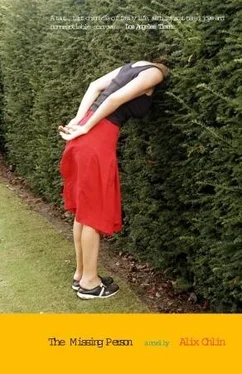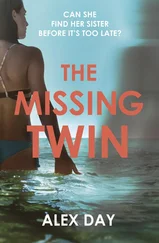In the house next door, the house where my mother answered the phone on the day my father died, staring at the receiver afterwards for a long time, as though it had grown utterly foreign to her — as if the world itself had grown foreign — a woman opened the front door and walked down the driveway carrying a large plastic cup with its own plastic straw. She opened the door to her SUV and waved in our direction. “Beautiful day, David!”
“Sure is, Marlene,” he called back.
I took advantage of this break in the conversation to walk around to the driver’s side of the Caprice.
David looked at me over the hood, squinting.
“I care about your mother,” he said, “and you should be better to her. You and your brother both.”
I was stuck to the ground, paralyzed. What saved me was a blur of orange Popsicle in the window, which somehow reminded me of Angus: the smoothness of his warm skin, its ammonia smell, its sweet, abundant freckles. As soon as I saw him again I could forget all of this existed; I would be calm. Was that a definition of love: a force that can drug you with calm and help you forget all the sandpaper realities of the world? Why not? On the force of this question I was able to get in the car and drive away, leaving all the Michaelsons behind.
Almost as much as the condo or Wylie’s apartment or the motel rooms I’d shared with Angus, the Caprice had become a kind of home. Feeling at ease on its cracked vinyl seats, surveying its dark-red dashboard and ivory paint, I’d come to think of it as mine. So when I left the Michaelsons’ I spent a while just driving around the August-dead city, the flowers dry and nodding, the grass in lawns gone halfway to dirt. The white rocks in other yards looked skeletal in the sun, each one a bleached, miniature landscape worthy of O’Keeffe. At an Allsup’s I stopped for gas and a bucket-sized soda, its sweet cold shooting straight to my brain. At the counter, a middle-aged couple was arguing about the nutritional value of the fried, crusty burritos that lay baking under the orange heat lamps, while the teenaged clerk batted her long, fake eyelashes in boredom.
At a pay phone in the back by the restrooms, I called information and asked if there was a listing for Plumbarama. There was, but the phone rang almost ten times before a man answered.
“Yeah,” he said. It wasn’t Angus.
“Is this Plumbarama?”
“Who wants to know?” he said.
His voice, growling and a little bit slurred, sounded vaguely familiar, but I couldn’t quite place it. “I’m sorry,” I said. “I must have the wrong number.”
There was a pause. “I’m sorry too, lady,” he said, then hung up.
I stood there for a moment sipping from my enormous drink, the sugar singing in my blood, and then called back. This time, the phone rang for almost a full minute.
“Yeah,” he said.
“Is this Gerald Lobachevski?”
“Who wants to know?” he said again.
Now I was sure it was him. In the background, I could even hear faint trills of slot machines and country music. “This is Lynn Fleming,” I said. The only reaction was silence. A boy in a red uniform came toward me swiping a dirty mop over the dirty floor, and I flattened myself against the wall to let him by. “Wylie’s sister,” I added. “I’m looking for Angus?”
“He’s not here,” Gerald said.
“Where can I find him?”
“I don’t know.”
“Can you tell him I’m looking for him?” I said.
“No.”
The conversation reminded me of the first time I met Angus, a memory that was dramatic and sensual in my mind: the dark, bare apartment, Angus bare-chested and heavy-lidded with sleep. The beginning of things. Angus then was every bit as unhelpful as Gerald was now; all he said was that Wylie had gone to the mountains, to grapple. Maybe Angus had some grappling of his own to do, or maybe his location couldn’t be discussed over the phone.
“If you see him, tell him I have a plumbing job for him.”
“I won’t see him,” Gerald said flatly, and hung up.
I left the Allsup’s and kept on driving. Where do you look in a sprawling city for an eggplant-colored van? Nowhere in particular. I went back to the foothills, where Angus saved me from heat stroke, and drank the rest of my Coke and dozed a little in a shaded picnic area. I was half-convinced that he’d automatically know where to find me, because he had a knack for showing up at the right place at the right time, and half-convinced that I’d never be able to find him again, a possibility that crashed inside me with dread. Inside the park restroom was a scrawl that read, JODI S. WILL SUCK YOUR COCK FOR FREE, ASK AT ALLSUP’S ON CANDELARIA, which was where I’d just been. I thought of the bored young woman watching the burrito argument from beneath her long fake eyelashes, and wondered whom she’d antagonized and how.
No one was home at Wylie’s. Turn your back on these people for more than ten minutes, I thought, and they completely disappear.
I tried to think this through, from Angus’s point of view. Say he was looking, what did he know about where to find me? That I was uncomfortable at my mother’s, that I drove around a lot, and occasionally rifled through books at the library. So I headed to UNM, to the fine-arts section, and spotted a redhead asleep in a carrel next to the books on Southwestern art of the latter twentieth century.
“Hey,” I said, shaking him. “Hey.” I wasn’t even going to pretend I wasn’t happy to see him. He woke up and pulled me onto his lap all in one second. Feeling his skin against mine was like coming home; it was like having questions only he could answer. He kissed me, his hands on the back of my neck. I moved around so I was straddling him. His hands moved down my sticky back, his mouth all over mine. We were jigsawed, meant to fit together, making a whole picture. He tapped on my shoulder, hard, and I leaned back to ask what he was doing. But it wasn’t Angus who had tapped.
“Excuse me,” a young woman said, “but you can’t do that in here.” A student worker with a cart of books to reshelve, she looked dismayed in the extreme.
I reached a hand up to wipe my mouth. My whole face was wet.
Angus said, “We were just leaving.”
So it started again: long hours in a motel room, the Nalgene bottle full of gin, the sweet delirium of sex, the TV on low. Midnight found us lying together hip to hip, the sheets disheveled, and Angus said, “We’ve got a real rapport.”
“If that’s what you want to call it,” I said.
“We don’t have to call it anything.”
“True enough,” I agreed, and fell asleep, breathing the smell of his skin.
Angus woke up laughing, which I’d never seen anybody do. He sat up and put his arms and legs around me from behind, my back to his chest, still laughing.
“What’s so funny?”
“I was dreaming,” he said in my ear. “I was dreaming this. ”
It was another hour or two before we left the room. Angus suggested we go past Wylie’s and check in there; they needed to plan their next move, he said, now that the mountain project was over.
“No plumbing today?”
“I’m on a hiatus,” he said vaguely, and started the car.
“You know, I called Plumbarama yesterday, looking for you, but they wouldn’t pass on a message.”
“You did what?”
“Called Plumbarama. I didn’t know how else to get in touch with you, short of calling all the motels in town.”
He was staring at me. “How’d you get the number?”
“It’s listed.”
“What did you say when you called?” He looked worried, for the first time that I’d ever seen.
“Why do you list the number if you don’t want people to call?”
Читать дальше












